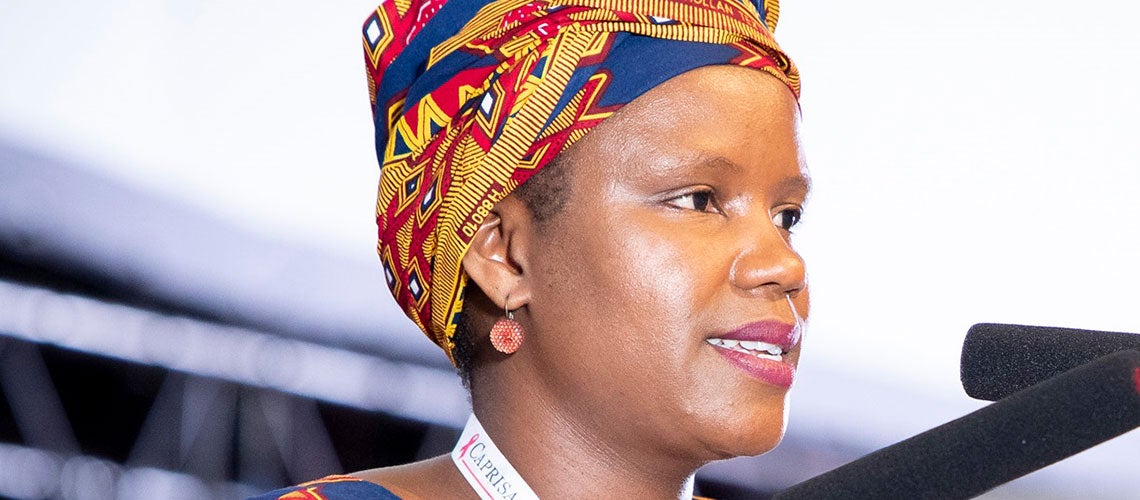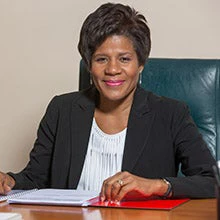 Dr. Nonhlanhla Yende-Zuma in the highly prestigious Centre for the AIDS Programme of Research in South Africa (CAPRISA), which is significantly contributing to COVID-19 research and has shaped the global response to the HIV pandemic.
Dr. Nonhlanhla Yende-Zuma in the highly prestigious Centre for the AIDS Programme of Research in South Africa (CAPRISA), which is significantly contributing to COVID-19 research and has shaped the global response to the HIV pandemic.
Imagine a world free from bias and discrimination, a world where your gender identity, the color of your skin, your economic status, where you come from or even your accent did not limit the path you chose to take. How would your life be different today?
Now imagine a young girl from rural Kwazulu-Natal in South Africa, who despite all odds, did in fact receive the necessary encouragement, guidance, and opportunity to pursue her dreams. This is the story of Dr. Nonhlanhla Yende-Zuma (PhD), who is today the Head of Biostatistics and Data Management in the highly prestigious Centre for the AIDS Programme of Research in South Africa (CAPRISA), which is significantly contributing to COVID-19 research and has shaped the global response to the HIV pandemic. How many more Nonhlanhla’s are out there?
When Dr. Nonhlanhla Yende-Zuma was a girl, she was motivated by her uncle, to study math and sciences, when these subjects were widely perceived by many in her village to be better suited for boys because they were believed to be more intelligent. In Nonhlanhla’s high school only male teachers taught these subjects, and her science class of 50 students had only a handful of girls. She persisted despite the lack of female role models or resources needed to excel. Coming from a family where she sometimes didn’t know where the next meal was going to come from, her family could not afford to buy the textbooks that she needed to study, so she borrowed the books from fellow students and successfully completed high school.
An upcoming World Bank report, South Africa Gender Assessment, to be published later this month, shows that although women have higher educational attainment in primary, secondary, and tertiary education, they are not enrolling in science, technology, engineering and mathematics (STEM) subjects at tertiary level. Nonhlahla defied this finding but even though she was a bright student, her road to university was not straightforward. She didn’t have access to information about how to get to university or about the career choices that were available to her. This, unfortunately, is a common situation where even the most committed students from under resourced schools and rural areas often find themselves.
To get better equipped, Nonhlahla first went to a community college for a year where she had access to a library for the first time, opening her world up to possibilities that were to become available to her. This was followed by another year in a Science Foundation Programme (SFP) at the University of KwaZulu-Natal (UKZN), a prerequisite for a place into the Bachelor of Science degree program for students like Nonhlanhla with no experience in laboratory work, critical in furthering study in sciences. It was during this course that she got to use a computer for the first time at the age of 22. As if that was not enough, she had to also contend with having to study her chosen subjects in English, having done all her schooling in isiZulu. She also learnt about statistics which later became a passion which pursued to PhD-level, armed with the belief that one’s background does not define one’s future and that it is up to one to maximize the opportunities given. As one coming from the small French island of Martinique in the Caribbean, to living in the big wide world, it is a belief I share wholeheartedly.
The first person from her village to go to university, Nonhlahla, has broken her family out of the cycle of poverty and paved a new way forward for generations. A true example of intergenerational mobility. She is an inspiration and mentor to many young people in her field. A day such as the International Women’s Day (IWD), when we honor women like Nonhlanhla, who have defied gravity of lack of opportunities to become successful in their fields, is an important one. There is work to be done to afford equal opportunities to girls that will enable them to reach their fullest potential. This is because married women with children are less likely to complete their STEM degree, pursue a STEM career, participate in the labor force, or be promoted in a STEM job. In fact, women are more likely to leave STEM because of work-life balance issues, a lack of part-time work, and limited mentoring as shown in the South Africa Gender Assessment.
Let me end by highlighting three actions set out in this assessment towards narrowing gender gaps in STEM and building on existing initiatives in South Africa. These were derived from successful global interventions on programs to challenge social norms around girls and women and STEM among students and parents. They are:
- Training for teachers/career services staff in schools to address gender bias and encourage girls’ performance in STEM subjects
- Scaling up the targeted peer group support and role modeling of girls in STEM, at the school level and in the workplace
- Increasing women’s access to internships and young professionals’ programs through partnerships with the private sector
While the above areas of action target government, educational institutions, and private sector actors, what can we do at the individual level to break the bias on this International Women’s Day? Nonhlanhla’ s story shows how exposure and opportunity can be all it takes to change the life of someone like her, who has the inherent passion but are lacking the guidance, support and exposure necessary to break the cycle of poverty trapping them and their families. Let’s play our part!


Join the Conversation